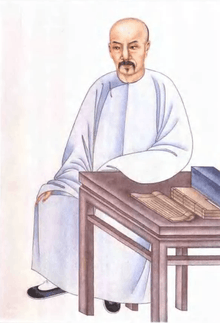Dai Zhen
| Dai Zhen | |
|---|---|
 Dai Zhen | |
| Born |
January 19, 1724 Xiuning, Anhui |
| Died | July 1, 1777 (aged 53) |
| Occupation | Chinese scholar of the Qing dynasty |
Dai Zhen (Chinese: 戴震; pinyin: Dài Zhèn; Wade–Giles: Tai Chen, January 19, 1724 – July 1, 1777) was a prominent Chinese scholar of the Qing dynasty from Xiuning, Anhui. A versatile scholar, he made great contributions to mathematics, geography, phonology and philosophy. His philosophical and philological critiques of Neo-Confucianism continue to be influential.
Dai's philosophical contributions included contributions to the Han Learning school of Evidential Learning (Evidentialism) which criticized the Song Learning school of Neo-Confucianism. In particular, two criticisms that Dai made was that Neo-Confucianism focused too much on introspective self-examination whereas truth was to be found in investigation of the external world.
Second, he criticized the Neo-Confucian drive to eliminate human desire as an obstacle to rational investigation. Dai argued that human desire was a good and integral part of the human experience, and that eliminating human desire from philosophy had the bad effect of making it difficult to understand and control one's emotions as well as making it impossible to establish empathy with others.
References
- Elman, Benjamin A. From Philosophy to Philology: Intellectual and Social Aspects of Change in Late Imperial China. Cambridge, MA: Council on East Asian Studies, 1984.
- Tiwald, Justin. Internet Encyclopedia of Philosophy entry on Dai Zhen
- Encyclopedia of Religion entry on Dai Zhen
External links
|